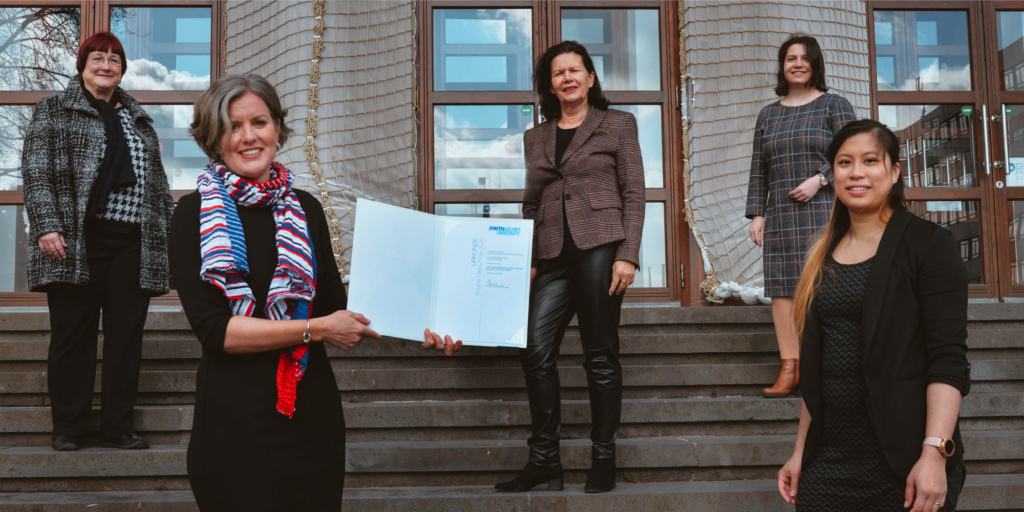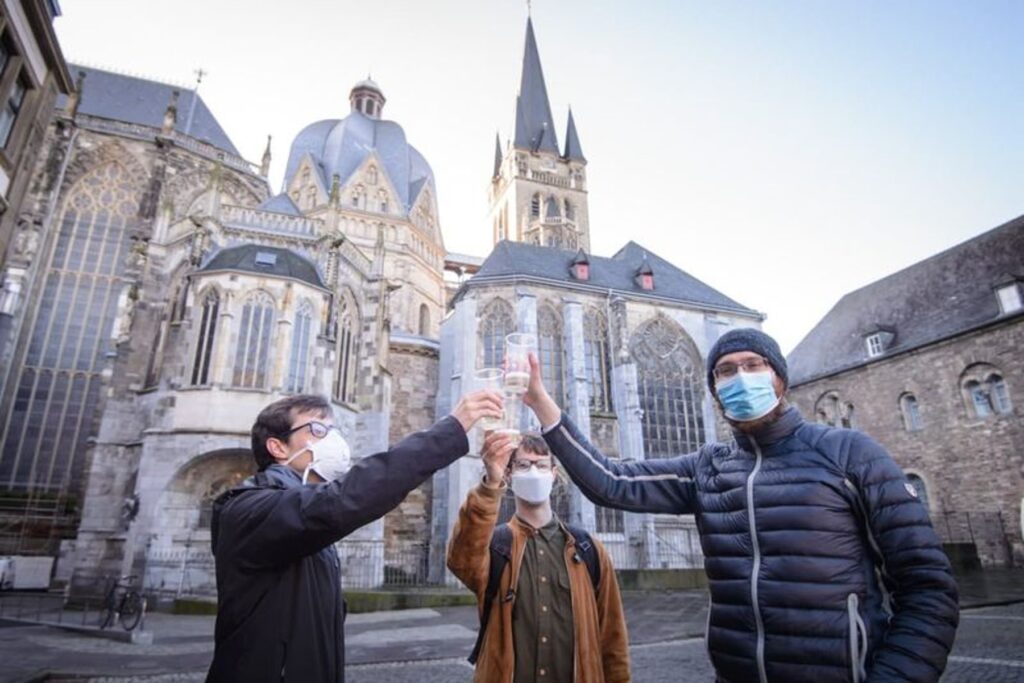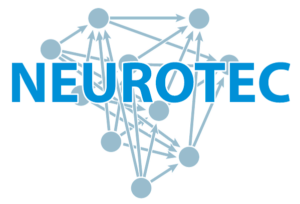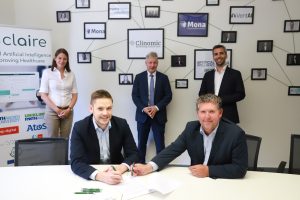Kategorie: ‘Informationstechnische Systeme’
Awardees of the Brigitte-Gilles-Award 2020
The Brigitte Gilles Award 2020 honors projects and initiatives that improve the conditions for women’s study, teaching, and research at the university. In this way, they contribute to increasing the number of female scientists and students in courses with a low representation of women.
We congratulate all the winners but are especially pleased for the two winners from our faculty. Professor Janina Fels and Ms. Karin Loh from the Chair and Institute of Hearing Technology and Acoustics (IHTA) were awarded for their initiative “The interactive world of acoustics for big and small children”. Here, concepts were developed that enable girls between the ages of three and twelve to explore and learn about hearing and acoustics in a playful and interactive way.
The awards were presented in a total of four categories and are endowed with up to 2500 euros. The awards in the other categories were given to the following researchers and projects: Katharina Müller from the Chair of Production Systems, the project “Hlumani – giving the future a fair chance” from the Chair of Landscape Architecture at RWTH, the University of Stuttgart, and the University of Cape Town and Dr. Anna Stertz from the Chair and Institute of Psychology.

Foto: Andreas Schmitter
IKS Startup – Elevear
Digital ear-opening – Hearing aids and other hearables often cause wearers to perceive their own voice in a distorted way, and chewing, swallowing, and even walking also generate unpleasant noise. The reason for this is the so-called occlusion effect, which occurs when headphones or hearing aids close off the auditory canal. This problem is addressed by the startup Elevear, which emerged from the Institute for Communication Systems and was successfully founded by Stefan Liebich, Johannes Fabry, Raphael Brandis, and Elfed Howells on February 4, 2021. Their Occlear® technology suppresses the occlusion effect and allows natural voice perception.
The project has already received the RWTH Innovation Award in 2019 and was accepted into the RWTH Incubation Program in January 2021 as one of twelve outstanding founding teams.

Hybrid Provision of Energy based on Reliabilty and Resiliancy via Integration of Dc Equipment
The project HYPERRIDE started on 1 October 2020. The four-year project contributes to the field implementation of DC and hybrid AC-DC grids. It will actively identify and provide solutions to overcome barriers to successful roll-out of new infrastructure concepts throughout Europe.
The Institute for Automation of Complex Power Systems (ACS) will concentrate its work on the development of automation services for the hybrid AC/DC grid. The focus here is on optimal power flow and fault management, as well as on the realization of a metering device specifically dedicated to DC technology: the DC Measurement Unit (DMU).
These solutions will be integrated into the open ICT platform, specifically tailored for integration with hybrid AC/DC distribution systems, and tested, among the others, in the demo site of the RWTH Aachen Campus Melaten.
Further Information on the Website of Institute for Automation of Complex Power Systems
Successful milestone reached at the halfway point for the NEUROTEC Project after one year

The successful acceptance of the central milestone by the project management organisation VDI/VDE/IT at the end of November 2020 marks the first successful stage on the path to the electronics of the future for the NEUROTEC structural change project funded by the BMBF.
The vision of the alliance of Forschungszentrum Jülich and RWTH is that future computers for artificial intelligence (AI) should increasingly come from Germany and the EU and thus contribute to Europe’s technological sovereignty. This will involve the use of new types of hardware that are more closely modelled on the brain.
One speciality of the alliance of Forschungszentrum Jülich and RWTH is the smallest electronic components that can be used for neuromorphic computing and that can be connected to conventional microelectronics.
Now, in NEUROTEC I, the concepts are being tested, and in the NEUROTEC II project, demonstrators are being sought that will show the new possibilities in laboratory samples.
You can find more information on the website of Forschungszentrum Jülich.
DFG priority program AUDICTIVE
Within the framework of the priority program AUDICTIVE of the DFG (German Research Foundation) three projects with the participation of Prof. Dr.-Ing. Janina Fels were approved. On the one hand, the coordination project, which focuses on interdisciplinary exchange and research data management, was approved. On the other hand, the project “Listening to, and remembering conversations between two talkers: Cognitive research using embodied conversational agents in audiovisual virtual environments”, which is a joint proposal with Prof. Dr. Torsten W. Kuhlen and Prof. Dr. Sabine J. Schlittmeier, will be funded. Furthermore, the project “Evaluating cognitive performance in classroom scenarios using audiovisual virtual reality – ECoClass-VR”, which is a joint proposal with Prof. Dr.-Ing. Alexander Raake, TU Ilmenau and apl. Prof. Dr. Maria Klatte, TU Kaiserslautern, will be funded.
The priority program “Auditory Cognition in Interactive Virtual Environments – AUDICTIVE” is intended to make it possible, by linking the three disciplines – acoustics, cognitive psychology and virtual reality/computer science – to significantly expand the knowledge about hearing-related cognitive performance in real scenes and thus to realize the development of an “auditory-cognitive-validated” VR technology. By applying interactive VR technology, it should be possible to understand auditory perception in complex audiovisual scenes that are close to real life. Situations such as classrooms, open-plan offices, multi-party communication or outdoor scenarios with multiple (and moving) sound sources should be better understood with the help of the results.
Rethinking Intensive Care Medicine
 Nowadays, patients receive comprehensive treatment from a number of qualified medical professionals. Through a unique combination of translational medical research, data science and computational intelligence, Clinomic GmbH aims to serve as an interface between medical professionals and databases. The result? Mona, the intelligent assistance system for intensive care units, which is designed to support nurses and doctors in the optimal treatment of their patients.
Nowadays, patients receive comprehensive treatment from a number of qualified medical professionals. Through a unique combination of translational medical research, data science and computational intelligence, Clinomic GmbH aims to serve as an interface between medical professionals and databases. The result? Mona, the intelligent assistance system for intensive care units, which is designed to support nurses and doctors in the optimal treatment of their patients.
Clinomic GmbH was founded in 2019 by an interdisciplinary research team. Among the founding members are Univ.-Prof. Anke Schmeink from the Department of Information Theory and Systematic Design of Communication Systems, Prof. Guido Dartmann from theInstitute for Communication Technologies and Embedded Systems and Dr. med. Arne Peine, Priv.-Doz. Lukas Martin and Univ.-Prof. Gernot Marx from the Universitätsklinik Aachen together with Univ.-Prof. Christoph Thiemermann from the William Harvey Research Institute of Queen Mary University of London.
Since its launch, Clinomic GmbH has not only won the RWTH Spin-off Award 2019, but has also received funding of 1.6 million euros and is a partner of renowned companies such as Microsoft, NVIDIA and Google.
Project “The People’s Ventilator – PV1000” enters the practice test
Since April 2020, employees, colleagues and alumni of the RWTH Aachen around Prof. Dr.-Ing. Dr. med. Steffen Leonhardt have been developing a ventilator that is medically suitable for ventilating COVID-19 patients in intensive care units over several weeks. It is intended to serve as a simple and robust device in situations where conventional ventilators are in short supply.
Now the project has reached an important milestone: the so-called “Graphical User Interface” is being tested by ventilation experts throughout Germany, including numerous medical directors of intensive care units. They are testing whether the result really does enable safe operation in intensive care units. The feedback is incorporated into the software as quickly as possible so that the next step – the integration of all individual elements of the PV1000 in a first prototype – can be completed soon.
Ventilators are complex technical systems that support different ventilation modes and must react correctly to many situations. An essential success factor is easy and comprehensible operation by medical personnel. In addition to the Chair for medical information technology (MedIT) , the Chair for medical technology (mediTEC) , another partner from the RWTH, was able to contribute its expertise in the safe and usable development of medical devices. For the PV1000, the operating concept developed by the Chair for computer science 11 – Embedded Software (i11) has now been implemented and the programming completed.
Artificial Synapses made to measure
“Resistance with memory” – As part of the research team of the Jülich Aachen Research Alliance (JARA), Professor Rainer Waser is working on memristive components together with the German technology group Heraeus. The latest results could pave the way for numerous applications, such as energy-efficient, non-volatile memories or neuro-inspired computers.
Jara.org, 11.05.2020
Contest 5G.NRW
State government supports 13 outstanding 5G projects with up to 26 million Euro
The new 5G generation of mobile communications not only enables higher data transmission rates, but also real-time transmission and the networking of machines, systems and robots in industry.
The Department of Information Theory and Systematic Design of Communication Systems ISEK has developed the project 5GComet, a real-time capable 5G-end-to-end infrastructure between field and cloud level for industrial applications in cooperation with Fraunhofer IPT, WZL and other partners. The aim is to achieve a cross-process network of smart workpieces, machines and services for intelligent applications to control and optimize production.
As one of 13 innovative projects, 5GComet is being funded with a total of 26 million euros.
Source: Wirtschaft.NRW
New Fraunhofer Center Digital Energy for Aachen
Even in challenging times, future crises must be addressed:
How can the challenges for the energy sector and the energy-intensive industry resulting from the coal phase-out be mastered?
Scientists at the new Fraunhofer Center for Digital Energy in Aachen are researching answers to these questions. This week the starting signal was given for the construction of the center (construction work is expected to start in 2022 on the Melaten campus). Under the leadership of Fraunhofer FIT, our chairs Automation of Complex Power Systems (Prof. Monti) and Active Energy Distribution Networks (provisionally Prof. Moser) are also involved.
According to Prof. Wehrspohn, Fraunhofer Executive Board member responsible for technology marketing and business models, this launch will make an important contribution to the innovation-oriented structural change in the Rhenish region. The aim is to lay the foundations for technically reliable, hacker-proof and economically attractive digitalized energy infrastructures in the Rhenish mining area and to put them into operation.
You find more information on the website of Fraunhofer Center Digital Energy



